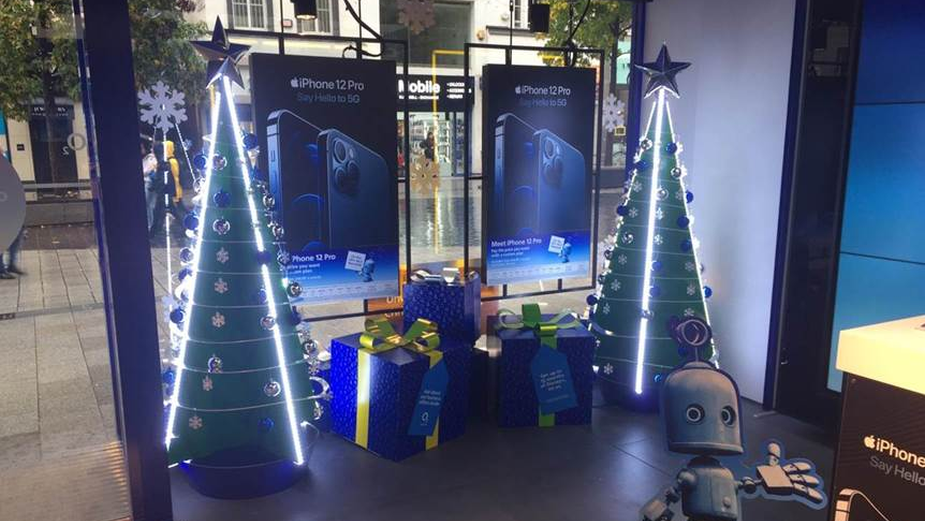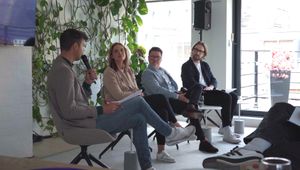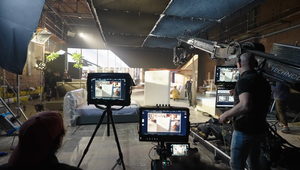
Problem Solved: How Tag Helped O2 with Their First Ever Fully Recyclable Christmas Campaign

Tag worked together with O2 Telefonica to create the brand’s first ever fully recyclable Christmas campaign for 2020.
From eco window vinyl to Christmas trees made from fully recyclable EB flute boards, Tag reduced O2’s environmental impact, not just at Christmas, but all year round, by giving the brand the ability to create fully recyclable campaigns in the future.
The campaign results were astonishing, with all in-store point of sale items made from 100% recyclable materials. The team at Tag removed 98% of the single use plastics and PVC materials, cutting 51 Tonnes (78%) of CO2 emissions.
THE PROBLEM
What was the initial brief or problem set out by the client?
For Christmas 2020, O2 Telefonica decided it was time to make a significant change, challenging Tag to produce its first ever fully recyclable Christmas campaign.
Their previous Christmas (2019) used 2,878 pieces of vinyl, 500 fully decorated traditional trees, 64 LED wreaths and 500 bespoke LED light frames.
Turning this level of campaign into a fully recyclable one was a major task to undergo.
And after a bit of digging around, what did you discover the ‘real’ problem to be (and what thinking or research brought you there)?
The challenge set by the client was to produce O2’s first ever fully recyclable Christmas campaign. In previous years the non-recyclable items would end up in landfill after end of use, and sustainability is a firm focus for O2.

IDEATION
After breaking down the initial problem, what were your first steps?
Our initial steps were to identify various sustainable materials that were suitable to withstand within a retail environment. Identifying a suitable eco window vinyl was the first step, the challenge was to find a material that not only provided great print quality but was also durable enough to withstand store staff installs, as the idea was for the O2 store staff to install the window vinyl’s, instead of a professional team. We tested 12 different eco vinyl’s before deciding on the chosen eco vinyl, which we still currently use today for window campaigns. On top of this, O2 requested a fully recyclable Christmas tree for each of their 460 O2 stores. I visited the ‘Christmas world’ exhibition in Frankfurt, and presented a variety of ideas, with O2 settling on a spiral Christmas tree made from fully recyclable EB flute board.

And how did you arrive at what sort of shape the solution would take? What options or ideas did the ideation process throw out?
Various ideas were proposed to the client, and months of development work was carried out to ensure the items would look of high quality within the windows. With the request for the O2 store staff to install the Christmas campaign themselves, we needed to ensure all items were durable and simple to install once delivered.
Was the problem relatively straightforward to ideate around or were there any blocks or challenges? How did you crack it? Was it a case of having to sift through a multitude of ideas and ‘murder some darlings’ or were ideas quite hard to come by (and why)?
My team and I rose to the challenge to achieve O2’s first ever fully recyclable Christmas campaign, it was far from straightforward, but with working very closely with the suppliers during the development stage, and also with the client to ensure we were on the right track, it was a real success. We provided a variety of ideas and designs to O2 which they were very impressed with, and also identified suitable eco materials to bring the chosen ideas to life.
Where did you look for inspiration?
I visited ‘Christmas world’ exhibition in Frankfurt, along with various UK trade shows and exhibitions, we also reached out to suppliers for ideas.
PROTOTYPE & DESIGN
Tell us about what you think were the interesting aspects of the designing and prototyping process.
The most interesting aspect was developing a spiral Christmas tree complete with lights, that was completely made out of EB flute board, and allowed for the tree to be delivered in pieces and easily assembled by the O2 store staff once delivered into stores. We worked closely with the supplier to achieve a design that worked well and could withstand a retail environment.
What were the most interesting conversations or challenges that emerged at this stage? (could be technical, could be emotional, aesthetic… really, what was the grit in this oyster!?)
O2 wanted to create a Christmas feel within their stores, they wanted to add to the customer journey, for Christmas to continue into the store past the window. This is why the Christmas tree was such a crucial part of the campaign, we also proposed a small Christmas tree to sit on top of the cash desks to give an extra Christmassy feel while customers check out at the till. O2 also requested for additional lights to be incorporated, so we suggested including fully recyclable LED flashing snowflakes which the client loved the sound of, these were the perfect addition to complete the Christmas design.
And what sort of talent/collaborators/specialisms did you have to reach out to and work with at this stage, and what did they bring to the mix?
The ideas, the development and designs were completely down to my O2 team and I. As we always do for O2, we went ‘above and beyond’ to ensure our client was very satisfied with the final outcome. This involved visiting various trade fairs and exhibitions, working closely with various suppliers, as well as the client.
Were there any novel technologies or creative risks that you had to play with, design around and if so, how did you navigate that?
The biggest creative risk was that we needed to ensure the spiral Christmas tree design would work and hold up in store. We performed various tests, and had several samples sent to our homes before the final design was approved.
LIVE
How did testing and iteration factor into your approach to this project?
Testing was crucial for the majority of the items, as we needed to ensure the items were durable and simple enough to be installed by the store staff.
What were some of the spicier issues and tweaks and back-and-forths that emerged from your testing and learning?
When researching and testing eco vinyl’s, we found that even though a vinyl material states it is eco-friendly, it does not mean the material is fully recyclable. There are a lot of expensive eco vinyl materials out there which produce bad print quality, and tear or crack very easily.
Now that the project is live, how is data and feedback helping to refine it?
The Christmas 2020 campaign was a complete success, we received great feedback from the client, as well as O2 store managers. Expectations are high for Christmas 2021 campaign to be bigger and better than last year.
Looking back over the whole project, what were the most personally interesting aspects of it for you?
Sustainability is a real passion of mine, and I found an interest in researching eco-vinyls to the point where I can literally go up to a window now and tell you if the window vinyl is eco-friendly or not (bit sad I know!). I thoroughly enjoyed the challenge set by the client, and also researching various concepts and coming up with new and innovative ideas that have never been done before within O2 stores.
And what impact has this project had on your client’s business or the initial problem you set out to solve - either anecdotal or data-based, depending on the nature of the project?
The results for the campaign was game-changing for O2, and led to -
- In-store point of sale items made from 100% recyclable materials
- Removed 98% of the single use plastics and PVC materials
- Installation by in-store staff, saving 42,500 miles of fitters’ travel
- 99.98% of collection and recycling by Tag
- Cut 51 Tonnes (78%) of CO2 emissions
And the best bit? The ability for all future O2 in-store campaigns to be fully recyclable, reducing the brand’s environmental impact not just at Christmas, but all year round.















